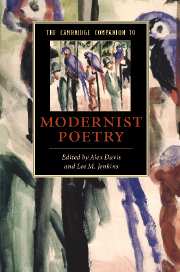1 - Modernist poetry in history
from Part I: - Contexts
Published online by Cambridge University Press: 28 November 2007
Summary
The discussion of modernist poetry in history seems at first glance to allow for a model in which poetry, in a specific phase of its development marked as 'modernist', will be situated in the wider context of a series of histories - the 'material' history of events, technologies and relations of production; and the 'cultural' history of ideas, artistic practices, science, education, and so on. In the context of the analysis of the social situation of modernist poetry, however, the term 'history' itself requires unpacking. A specific poem may be judged 'modernist' in terms of its advanced technical features or in terms of the modernity of outlook of the producing poet or implied readership. Underlying such a judgement is something more than the notion that a poem or poet is 'modern' in the sense of 'recent'. The notion of modernism in the arts seems implicitly to rest upon a broader notion of modernity in society. This model - modernism in the arts corresponding to modernity in society - already seems conveniently to present something of which a history might be written, a promising set of correspondences between social realities and artistic practices. The cultural historicism of contemporary scholarship will commonly present accounts which depend in one way or another on this paradigm. However, history too belongs to modernity and is a product of it. History can be set alongside poetry and need not be granted instant analytic priority as something which contains poetry, or to which poetry in some simple sense belongs.
- Type
- Chapter
- Information
- The Cambridge Companion to Modernist Poetry , pp. 11 - 27Publisher: Cambridge University PressPrint publication year: 2007
- 1
- Cited by

